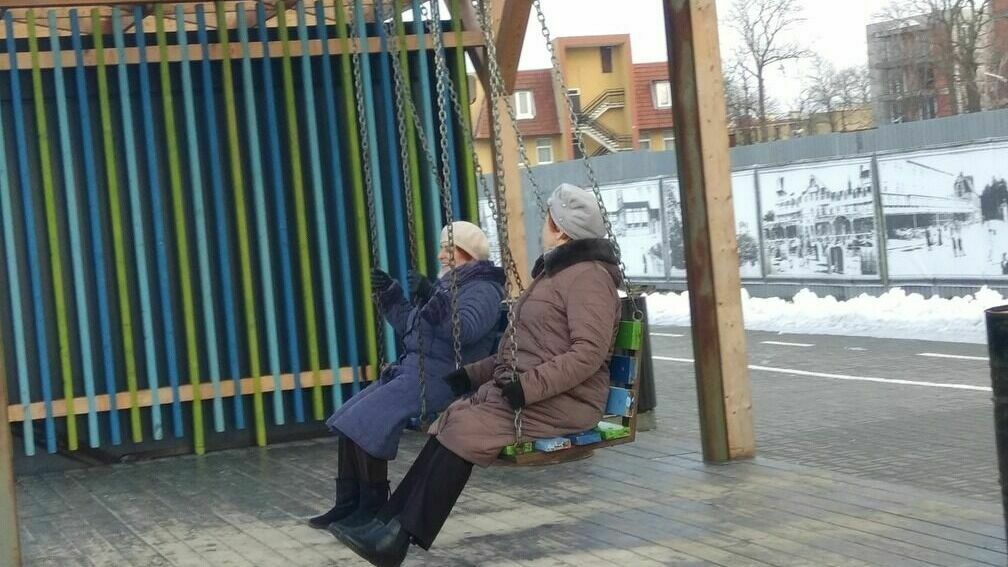Posted 6 марта 2023, 08:44
Published 6 марта 2023, 08:44
Modified 6 марта 2023, 08:51
Updated 6 марта 2023, 08:51

Without respect for gray hair: elderly Russians are offended by poor treatment
The wonderful poetess Olga Sedakova recently described in her blog a case that happened to her in a Moscow store:
"In the queue at the store at the checkout, the person standing behind me fussed, and the cashier says, pointing at me:
- Wait! I'll serve the granny, and then you!"
It is impossible to call such an appeal otherwise than disrespect for a person, journalist Yelena Zelenskaya is sure:
"It's nothing, of course, against the background of what is happening, but it's still amazing how the Russian language has lost the form of respectful treatment.
The most generalized verbal image is a woman in a red jacket, I'm telling you!
But even worse is just a neutral mention of a person in the third person. Especially about people in years. No, there is no word that can designate a woman over 60 years old. In the most positive connotation, it sounds rude or vulgar. Granny. An old hypertonic. The old lady. There is no word at all for the elderly. Yes, there are few of them themselves...."
Commentators fully agree with this assessment of the language situation:
- So there is no established appeal to anyone at all - to men and women, of any age!- And in Madrid, Milan, Barcelona, elderly ladies with beautiful hairstyles and elegant clothes sip their aperitif, and no one will call them grandmothers, in Russia and here, what is there to hide, somehow growing up is not respected.
- There is no respectful treatment of an equal in Russia. Un general.
Where does politeness come from in the jungle?
It should be noted that Novye Izvestia has repeatedly raised this problem, the age of which has exceeded a hundred years.
It was with the coming to power in the country of the Bolsheviks that the system of treatment developed over the centuries was destroyed at the root, and the new one with the words "comrade", "citizen" and "citizen" never took root. It was not instilled for a very simple reason: in fact, there was no equality proclaimed by these appeals in Soviet society, just as there was no such thing in pre-Soviet society. It did not appear even in post-Soviet times, besides, the respect of citizens for each other has almost completely disappeared. As commentators rightly point out: "In modern Russia, there is no respect between people, there is no respect for people from the authorities. Where does a polite form of address come from? Plus, there is a cult of strength in this jungle, so old age is despised, especially for women..."
It is also noteworthy that the authorities are not making any efforts to overcome this unpleasant situation. But with her extraordinary propaganda abilities, she could easily have done it in more than 30 years of the existence of the so-called "new Russia". But it does not, because it does not respect its citizens. So they have to look for a way out of the situation themselves, that is, ways of addressing Russians to each other:
- I propose to introduce the common German: Madam and mister. And stop fighting.- I address mature women as "lady" or "madam".
And in response to me, at first they are surprised, and then they smile. And I am pleased.- It is a pity that the address "sir" or "madam" has not entered our everyday life....
Although it is difficult to call a drunken drunk a "sir", he will perceive it as a sophisticated mockery.- I looked through all the comments and I see that no one offered to address strangers — "citizen" and "citizen".
A little outdated, but nothing. This is neutral and quite correct for the middle and even for the older age.
But the most interesting thing is that in Europe, with which Russia has always taken an example, the same problem has arisen.
However, the Europeans approached it from the other side, proclaiming real universal equality, which automatically abolishes "masters", regardless of gender, social status and even age:
- German has the same problem. Everyone says, "Excuse me, please." There is a "young man" and a "young woman", but even this is dying out, so only the old generation says. There is a friendly "old man". Everything is like ours.- Sweden has long ago canceled the mistress with the master, no Fru, freken and herr, everyone addresses each other with the words "hey, you".
In this respect, I envy the Poles: call me Pani, kiss my fingers like a Valley. I'll also add: in Russian, the form of addressing you has been preserved, and in Swedish, for example, everyone pokes each other, even a five-year-old kid used to call the teacher a miss and addressed you, and now pokes. Everyone is always poking, because you have exhausted the form with a special reform.